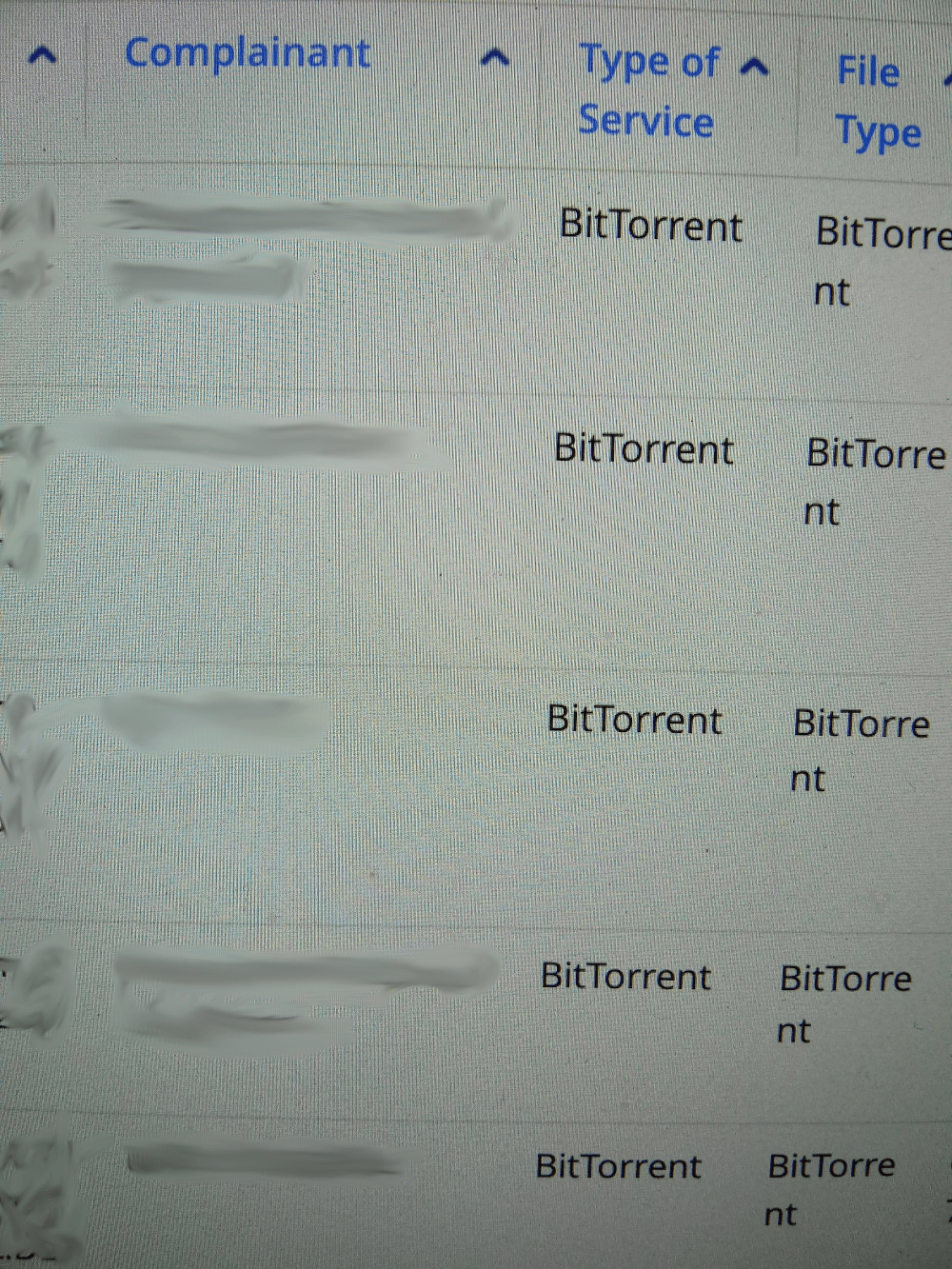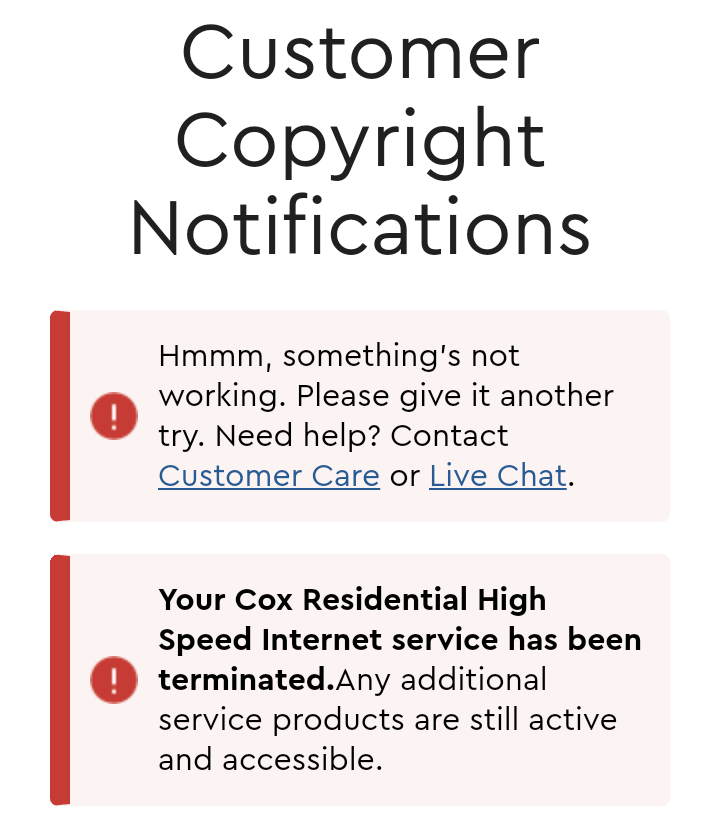 In 2019, ISP Cox Communications was hit with an unprecedented $1 billion verdict after a jury found it liable for infringements carried out by its customers.
In 2019, ISP Cox Communications was hit with an unprecedented $1 billion verdict after a jury found it liable for infringements carried out by its customers.
More than 50 music companies including Capitol Records, Warner Bros, and Sony Music, successfully argued that Cox failed to terminate repeat copyright infringers and profited from their piracy. The ISP was found to be both contributorily and vicariously liable and ordered to pay $99,830 for each of 10,017 copyrighted works.
Cox is still fighting that decision (1,2) but questions remain over its repeat infringer policy and precisely what type of behavior might trigger it.
Last year, TorrentFreak wrote to all major ISPs in the United States, Cox included, asking them to provide precise details of their repeat infringer policies. None replied, which given the high-stakes probably shouldn’t come as a surprise.
Recently, however, we were able to find a Cox customer who told us about his experiences with the company which suggest that higher numbers of complaints can result in tough measures.
How Cox Handled Allegations of Copyright Infringement
“I had a lot of copyright notices through the past couple of years and [Cox] do warn that you will be disconnected if they continue to receive copyright notices. But they’re vague on if and when that disconnection would happen,” he explained.
“Every time there’s a copyright claim they shut your internet off and you have to call to know why and they’ll warn you and turn you back on. You can check your account if you have alternate internet access and see what the copyright claim is specifically. Sometimes the only way to know is to call and ask.”
Fast forward to this month and matters quickly escalated. The customer informs TF that Cox has a panel where details of copyright infringement claims can be viewed. For privacy reasons the image below is cropped and redacted but it originally showed the content supposedly infringed, the complainant, the type of service allegedly used to infringe (in this case BitTorrent), and other information such as times and dates.

This time around, however, something was different. Our source says that the above violations screen which detailed the five most recent infringements had been reset to zero. As it turned out, that wasn’t accompanied by further good news.
Too Many Allegations of Infringement – Internet Access Terminated
“A few days ago I checked my account. The violations were gone from the screen where they usually keep score. And there was a message saying my service has been terminated,” he revealed.
“My internet was still working fine though. I thought maybe they’re doing what I heard about in the old days where they just start you over. Nope. On [date redacted] it just shut down in the middle of a long message I was typing. Called them and they said I was terminated for six months. Didn’t have a concrete specific notice or heads up.”
As the image below shows, the customer’s information screen at Cox shows the termination clearly but adds that “any additional service products are still active and accessible. This indicates that rather than terminate all of its business dealings with a customer, the company is happy to retain them for other business.

In a communication sent to our source titled “Notice of AUP Violation”, Cox says that while it does not “monitor nor control” the information transmitted by customers, it does take action based on allegations from third-parties.
Termination Parameters – Around Six Allegations, Maybe More
“We have a policy, however, consistent with the Digital Millenium Copyright Act, to take steps when we receive communications of claimed infringement. We also have a policy of terminating repeat infringers in compliance with Digital Millenium Copyright Act Safe Harbor for online service providers,” it reads.
The specifics of that policy remain unclear. Cox refuses to say how many complaints trigger a termination, or over what period of time. Their terminated customer, however, has some thoughts on what the threshold might be.
“Upon termination, the Cox rep said there were a total of nine violations. Some were rapid-fire (two at a time) and the latest as recent as [the day before the disconnection] but Cox wasn’t notified of it until [the morning after] which automatically shut the internet off to where I have to call to find out what happened,” he explained.
“So it likely made it to six violations, was prepared for termination, with another violation appearing again before actually being terminated. There were at least a couple of earlier violations that disappeared from the list from long ago but the Cox rep did have them ultimately listed, reading them to me. I remember them all.”
We’ve been asked not to identify the specific content allegedly infringed but we can confirm that the notice senders were Paramount, Viacom, and NBCUniversal. Perhaps surprisingly to those who believe that older content isn’t monitored so intensively, the movies in question spanned from the 1980s to the early 2000s.
The Fallout
According to our source, there aren’t too many options where he lives to replace Cox, which causes problems.
“I don’t have any blame for Cox in all this. Their hands are tied. The only blame are their high prices and monopoly on the service in certain areas, making them the only close to reliable internet service around in town,” he said.
“For the next six months, smartphone internet will be the only internet anyone will be using here. The bright side is that I will be saving over $800 which otherwise would have gone to Cox.
“It’s just wrong that internet service providers have to follow the orders of a third party via CLAIMS of infringement,” he continued.
“One cannot control what everyone does on the internet in one household or business. To deny internet service when they’re the only choice around is wrong.”





